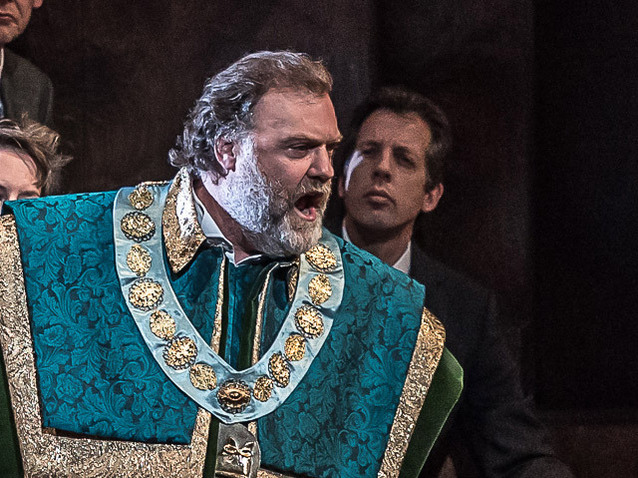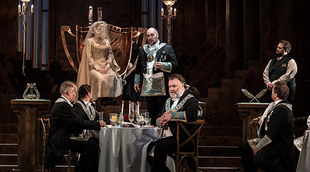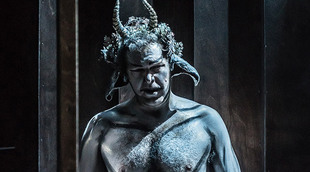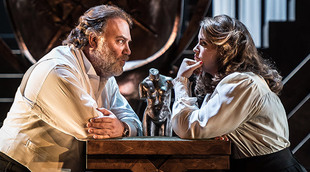 © (C) ROH. PHOTO BY CLIVE BARDA
© (C) ROH. PHOTO BY CLIVE BARDA
Many Wagner fans will rank Die Meistersinger von Nürnberg as one of their favourite works of all time, but the real measure of its strength is that many an opera-goer who normally avoids Wagner like the plague will make a special exception for Die Meistersinger. Unlike virtually all of the composer’s other mature works, it is not about gods, grails, rings and potions, but rather flesh and blood human beings. By exposing all of the foibles and frailties of this strangest of species it can, as much as anything, be extremely funny.
Set in Renaissance Nuremburg, the story concerns a young knight, Walther von Stolzing, who tries to win the hand of the fair Eva Pogner. To do so he must first join the Mastersingers, an esteemed band of poets drawn from the city’s powerful guilds, and this involves writing and performing a song that meets a ridiculous number of rules concerning rhythms, rhymes and stanzas. As we see what Walther is up against, it is clear that much of the humour derives from watching people who take themselves so seriously.

Die Meistersinger von Nürnberg; © Clive Barda
Kasper Holten, in his final new production as director of the Royal Opera, updates the action broadly to the twentieth century. He endeavours to set the entire drama within the Mastersingers’ own world which he sees as ‘a gentlemen’s club, where powerful men go through antique rituals, dress up in symbolic costumes and offer women as prizes in competitions’.
However, although in the opera Wagner was attacking conservative tastes, and the adherence to various musical ‘rules’ simply because they had always existed, equally he was not throwing the baby out with the bathwater. The Mastersinger Hans Sachs sings of the need to respect and revere the Mastersingers who, for all of their faults, are noble, and the opera also represents an aspiration on Wagner’s part to put the artist centre-stage in society. When in this version we see the Mastersingers dining in their club in Act I, with glamorous women hanging from their arms, we are reminded more of modern day film stars who can enjoy a high standing in society and a pampered lifestyle. In other words, to transfer the situation from one where individuals have earned their place in society through poetry (rather than wealth or rank) to one where it is being suggested that they are excessively revered, bloated and shallow inverts the original commentary to a point that undermines the intentions of the opera.
The production is undoubtedly detailed and this has its positive and negative sides. It seems a shame to present the opening chorale as a choir rehearsing for Eva’s wedding with lots of other preparatory activities going on in tandem. The music is so beautiful that it requires nothing other than to be presented straight with no distractions, and the excessive dynamic variation inserted to show how this choir is grappling with the piece actually undermines the music’s impact.
The Act I scene when Walther first auditions to become a Mastersinger is stronger as it reveals the twelve Mastersingers as all having different personalities as they exchange jokes and reveal disagreements, while still showing a strong sense of bond and common purpose. The detail displayed as Walther sings ‘Fanget an! So rief der Lenz in den Wald’ is staggering but again has its good and bad sides. The town clerk and Mastersinger Sixtus Beckmesser is the marker and, although normally he is concealed from the audience, Holten ensures he can be seen. This works because the performer Johannes Martin Kränzle is such an engaging actor that it is good to see exactly how he reacts to the song, but also because it introduces new dynamics. Here we see Beckmesser raise his board within the first few seconds as he deems the maximum number of errors has been reached, and the other Mastersingers simply ignore him and carry on listening, with at least some of them looking reasonably impressed.
The downside, however, is that the moment in which Beckmesser normally ‘bursts on’ brandishing his board with all of the chalked up errors falls flat because we have seen him doing similar things for several minutes before this point. All of the activity also distracts from the actual performance of the song itself, which is a shame because Wagner deliberately lines things up so that the beauty of it can shine through before a separate section of it later in the scene takes place amidst total pandemonium. Nevertheless, the scene does reveal how the Mastersingers only really unite in their opposition to Walther’s song after Beckmesser leads the charge, suggesting that one reason why they prove so receptive to his ‘Morgenlich leuchtend im rosigen Schein’ in Act III is because the by then humiliated town clerk is no longer in a position to incite opposition.
Holten ensures smooth transitions from scene to scene so that Act II opens on the same set as, and very obviously in the direct aftermath of, Act I’s audition. Similarly, Act III’s first scene is set up so that as it ends Sachs can turn to see the stage set for the Feast of St John festivities. All of this is designed to position the entire drama within the Mastersingers’ own world, but much else seems to be lost in the pursuit of this aim. The fact that Veit Pogner wonders to himself whether to visit Sachs’ house when the latter has until a few seconds before been sitting next to him does not on its own matter. However, the failure to play out Act II in real space acts as a barrier to us feeling the atmosphere of an evening and night in Nuremburg. It may not be the intention to generate that here, but what is created prevents us from connecting emotionally with the protagonists because they seem to operate in virtual isolation, devoid of any meaningful context.

Die Meistersinger von Nürnberg, David Shipley (Nightwatchman)
© Clive Barda
Beckmesser’s comical serenade does prevail but only because Kränzle and Bryn Terfel as Sachs are such engaging performers. However, inserting such overtly ‘Bacchanalian’ elements into the riot at the end of Act II makes it feel less human. In addition, putting the Nightwatchman at the centre of the riot by keeping everyone on stage at the end of the scene destroys the beauty of the joke that he appears twice at calm moments, thus being entirely oblivious to the chaos that has occurred in the intervening period. Of course, this scene represents part of the intention to show how ‘a midsummer night’s dream exposes all the Mastersingers’ demons’ but thrusting everything into virtually a fantasy realm once again undermines the human side to the story.
Act III contrasts Sachs’ workshop with the open space of the meadow where the Feast of St John festivities take place by seeing the latter as some form of studio set, and the former as the corresponding backstage area. It is a clever idea, but undermines the intimacy of Sachs’ various individual encounters across the act with his apprentice David, Walther, Beckmesser and Eva.
Act III’s second scene is more successful as a stadium-like structure creates an arena in which the crowd have ample opportunity to applaud or boo as the occasion demands. The parades of the various guilds are also pleasing. By each one being presented as a piece of mini-theatre they avoid seeming overly nationalistic, something every director has been aware of ever since Hitler embraced the opera, but do not fall into the trap (as they did in Graham Vick's 1993 production for the Royal Opera) of feeling deliberately silly as a way of ensuring they come across as harmless.
The choice of ending is in some ways problematic since it does not seem to have been sufficiently established beforehand that Eva might actually be unhappy with Walther becoming her husband. However, if Holten's aim is actually to reveal the mentality of a backward looking gentlemen’s club that will never change he succeeds. As we watch Walther being embraced as a Mastersinger it appears as if he may be perpetuating the status quo by simply enjoying all of the honour that goes with his newfound position. The price of this perpetuation is that at least three people around him are left feeling immensely sorrowful.

Bryn Terfel (Hans Sachs) and Rachel Willis-Sørensen (Eva); © Clive Barda
If the staging has its fair share of highs and lows, the evening’s musical credentials are more unequivocally successful. In the pit Sir Antonio Pappano ensures a smooth and sprightly rendering of the score, which is strong on detail but never to the detriment of capturing the sweeping nature of the music. The cast is led by Bryn Terfel who is a very experienced Sachs, and does not disappoint here as his performance proves both warm and engaging. Gywn Hughes Jones is an excellent Walther whose ringing tenor displays both passion and sensitivity, and who in Act III convincingly conveys the sense of effort and concentration required to commit his dream to paper in the form of the prize song.
Allan Clayton, with his fabulous tenor, is an immensely spirited and effective David, while it is hard to picture anyone playing Beckmesser better than Johannes Martin Kränzle, so strong are his gestures and sense of comic timing. He may be well established in mainland Europe but he only made his Metropolitan Opera debut in 2014 as Beckmesser, having played the part for Glyndebourne in 2011, and his Royal Opera debut only came last September when he played Don Alfonso in Così fan tutte.
Rachel Willis-Sørensen has a very accurate, rounded and powerful soprano as Eva while mezzo-soprano Hanna Hipp proves equally effective as David’s fiancé, Magdalena. Stephen Milling puts his brilliantly firm yet nuanced bass to good use in the role of Veit Pogner, the city’s goldsmith and Eva’s father. Finally, Sebastian Holececk as Mastersinger Fritz Kothner, with his wondrous bass-baritone, really stands out as something special in a part that is important, but not necessarily easy to shine in.
By Sam Smith
Die Meistersinger von Nürnberg | 11 – 31 March 2017 | Royal Opera House, Covent Garden
the 14 of March, 2017 | Print
Comments